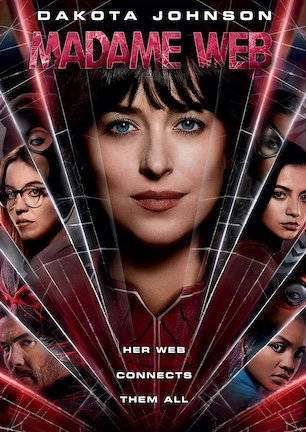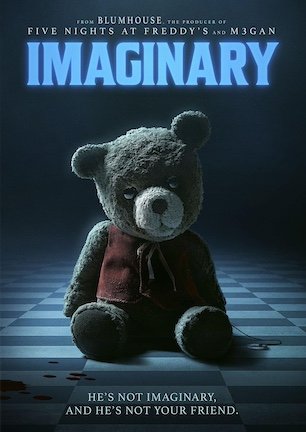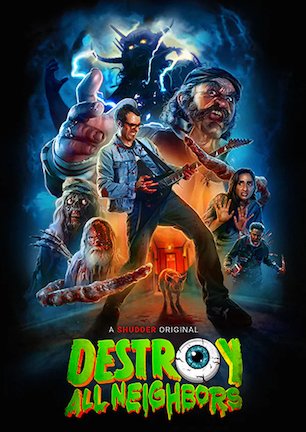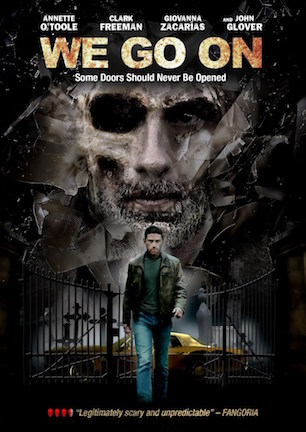Studio: Brain Damage Films
Director: Donatello Della Pepa, Angelo & Giuseppe Capasso, Edo Tagliavini, Alberto Viavattene, Nathan Nicholovitch, Domiziano Cristopharo, Giuliano Giacomelli
Writer: Luca Ruocco, Emiliano Ranziani, Andrea Cavaletto
Producer: Antonella Volpe, Federico Giacinti, David Marocco
Stars: Cristiano Morroni, Dario Biancone, Angelo Campus, Francesco Malcom, Federica Tommasi, David D’Ingeo, Virgilio Olivari, Claudio Zanelli, Lucio Zannella
Review Score:
Summary:
Italian filmmakers offer contemporary interpretations of seven classic works from Edgar Allan Poe.
Review:
Adapting the work of Edgar Allan Poe for the screen is a tradition practically as old as cinema itself. Rarely are those adaptations ever set outside the 19th century era to which Poe belonged, which gives “P.O.E. Project of Evil” a somewhat unique advantage as a starting point. A companion piece to the 2011 anthology “P.O.E. Poetry of Eerie,” “P.O.E. Project of Evil” tasks a handful of Italian filmmakers with creating contemporary interpretations of seven works from the gothic suspense master.
Now admittedly, it has been many years since I last read any of his original writings, but I do not recall Poe’s stories so heavily featuring this many prostitutes, porn stars, and sideshow gorillas sporting raging hard-ons. So to say that this film’s creators were less than literal and more than liberal in how they took the source material would be putting it mildly.
Case in point: The first of seven segments retells the classic tale of “The Pit and the Pendulum” without actually including a pendulum. The soundtrack adds a metronome pulse beat meant to symbolically echo a nonexistent blade swing, though the same trick could just as easily be used to recreate “The Tell-Tale Heart” without actually featuring a heart.
This version of “The Pit and the Pendulum” is an exercise in psychological mood with its story of a confined test subject who is paranoid over the Roger Rabbit-like black hole expanding in his white-walled medical room. It is a serviceable introduction to the anthology, even if it is only a 10-minute setup for an unexpected creature appearance as the punchline.
“Alone” is supposedly based on a 22-line poem whose meaning has been debated for years. I say “supposedly” because there is nothing in those 22 lines that even remotely hints at this particular story of a sadistic torturer, a taunting victim, and a torso in the adjacent room. “Alone” suffers from a lost in translation effect of English dialogue spoken by Italian actors in a manner that sounds like some sort of odd fusion between the two languages.
Not until the end credits rolled did I realize that the main character’s name was “Pepper Face,” since the folding of a paper airplane while he spoke hammered it into my ears as “Paper Face.” As a result of such stilted speaking, the story is a hard one to get straight, although the segment does showcase chilling imagery of a limbless torso strapped to a table.
“Loss of Breath” takes the film into increasingly experimental territory as a predominantly black and white segment told silent movie-style with its dialogue transcribed on intertitle cards. It makes for a peculiar framing device, although it is no stranger than the random cutaway shots of a man stroking himself under a towel or a naked woman observing calmly while clad in a leather and chain dominatrix outfit.
The overacted expressions and graphic castration scene make the short uncomfortable to watch on multiple fronts. More problematic is a confusing ending that requires researching the original story to fully understand what happens with the resolution.
“Morgue Street” marks the point where “POE” really takes a turn from unusual artistry to nearly absurd outrageousness. It is unclear if this short’s director intended to shock or to amuse, but the sight of a guy in the Banana Monster suit from John Landis’ “Schlock” mouth raping one hooker before giving a backdoor assault to another inspires a forehead slap for possibly unintended silliness. The depravity displayed is so comical that it is impossible to know whether applause or condemnation should be the appropriate response for what “Morgue Street” puts onscreen.
A largely wordless affair, “The Tell-Tale Heart” concluded its story before I realized it had even been begun. The segment blurred by in such a haze of too-philosophical-for-its-own-good indulgence that I frankly do not know how to properly react to it. Shrugging my shoulders and moving on will have to do.
“The System of Dr. Tarr & Prof. Fether” keeps rolling with the entire film’s predominant theme of confinement and torture. With one arguable exception, every story in “POE” involves someone strapped, chained, trapped, or institutionalized. Maybe I never consciously realized how fascinated Poe himself was with the topic. Or maybe that fascination merely comes from these filmmakers instead. Either way, imprisonment and suffering choke every avenue throughout the film, almost as much as full-frontal male nudity, which is one more obsession to be added to the list of what “POE” most likes to put front and center.
“The Premature Burial” finishes the film with a payoff that is modestly weak, but a presentation that is conceptually strong. With a score that completes the clearly intended Lucio Fulci vibe, “The Premature Burial” features enough casket-confined claustrophobia and bloody fingernails scraping madly against a wooden coffin lid to make even the most resilient viewer flinch and cringe.
As is expected with any horror anthology from multiple creators, the mix on hand varies both in quality and in ability to satisfy. Such loose adaptations rule out appeal for Poe purists, and the excessive brutality and graphic nudity, sometimes with cheesy delivery, limits the audience even further. In the end though, what “P.O.E. Project of Evil” comes up with is a collection of horror shorts that cannot exactly be described as “good”, but there are still enough oddball oddities on display to make it bizarrely fascinating in just about the weirdest possible way.
Review Score: 60







If you want to see impossible amounts of blood explode crimson colors like the world’s worst version of a gender reveal, well, “Abigail” at least has that.